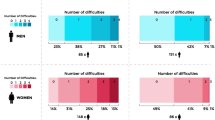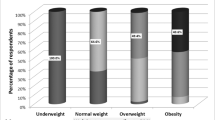Abstract
Objective:
To examine associations between defined weight expectations and anthropometric profile and to identify psychological and eating behavioral factors that characterize women having more realistic weight expectations.
Methods:
A nonrandom sample of 154 overweight/obese women completed the ‘Goals and Relative Weight Questionnaire’, which assessed four weight expectations: (1) dream weight (whatever wanted to weight); (2) happy weight (would be happy to achieve); (3) acceptable weight (could accept even if not happy with it); and (4) disappointed weight (would not view as a successful achievement). Psychological assessments evaluated dysphoria, self-esteem, satisfaction with one's body (i.e., body esteem) and weight-related quality of life. The ‘Three-Factor Eating Questionnaire’ assessed eating behaviors: (1) cognitive dietary restraint (control of food intake), (2) disinhibition (overconsumption of food with a loss of control), and (3) susceptibility to hunger (food intake in response to feelings and perceptions of hunger).
Results:
Women's expectations for their dream (60.6±6.0 kg), happy (65.2±6.4 kg) and acceptable (67.9±6.8 kg) weights corresponded to higher percentages of weight loss (24.2±6.6% or 19.8±7.1 kg, 18.6±5.8% or 15.2±6.0 kg and 15.2±5.7% or 12.6±5.8 kg, respectively) than goals recommended for overweight individuals. Defined weight expectations were positively associated with current weight and body mass index (BMI; 0.37⩽r⩽0.85; P<0.0001). When women were matched one by one for their current BMI, but showing different happy BMI, women with a more realistic happy BMI were older (P=0.03) and were characterized by a greater satisfaction towards body weight (P=0.04), a higher score for flexible restraint (P=0.003) and a lower score for susceptibility to hunger (P=0.02) than women with a less realistic happy BMI.
Conclusion:
These findings suggest that having more realistic weight expectations is related to healthier psychological and eating behavioral characteristics.
This is a preview of subscription content, access via your institution
Access options
Subscribe to this journal
Receive 12 print issues and online access
$259.00 per year
only $21.58 per issue
Buy this article
- Purchase on Springer Link
- Instant access to full article PDF
Prices may be subject to local taxes which are calculated during checkout

Similar content being viewed by others
References
Flegal KM, Carroll MD, Ogden CL, Johnson CL . Prevalence and trends in obesity among US adults, 1999–2000. JAMA 2002; 288: 1723–1727.
Tjepkema M, Shields M . Nutrition: Findings from Canadian Community Health Survey – Adult Obesity in Canada. Measured Height and Weight, Statistics Canada: Ottawa, 2005.
Pelletier LG, Dion S, Levesque C . Can self-determination help protect women against sociocultural influences about body image and reduce their risk of experiencing bulimic symptoms? J Soc and Clin Psychol 2004; 23: 61–88.
Crawford D, Campbell K . Lay definitions of ideal weight and overweight. Int J Obes Relat Metab Disord 1999; 23: 738–745.
Green KL, Cameron R, Polivy J, Cooper K, Liu L, Leiter L et al. Weight dissatisfaction and weight loss attempts among Canadian adults. Canadian Heart Health Surveys Research Group. CMAJ 1997; 157 (Suppl 1): S17–S25.
National Institutes of Health. The Practical Guide: Identification, Evaluation and Treatment of Overweight and Obesity in Adults. National Institutes of Health: Bethesda MD, 2000.
Foster GD, Wadden TA, Vogt RA, Brewer G . What is a reasonable weight loss? Patients’ expectations and evaluations of obesity treatment outcomes. J Consult Clin Psychol 1997; 65: 79–85.
Dalle GR, Calugi S, Magri F, Cuzzolaro M, Dall'Aglio E, Lucchin L et al. Weight loss expectations in obese patients seeking treatment at medical centers. Obes Res 2004; 12: 2005–2012.
Dalle GR, Calugi S, Molinari E, Petroni ML, Bondi M, Compare A et al. Weight loss expectations in obese patients and treatment attrition: an observational multicenter study. Obes Res 2005; 13: 1961–1969.
Foster GD, Wadden TA, Phelan S, Sarwer DB, Sanderson RS . Obese patients’ perceptions of treatment outcomes and the factors that influence them. Arch Intern Med 2001; 161: 2133–2139.
Foster GD, Phelan S, Wadden TA, Gill D, Ermold J, Didie E . Promoting more modest weight losses: a pilot study. Obes Res 2004; 12: 1271–1277.
Provencher V, Begin C, Piche ME, Bergeron J, Corneau L, Weisnagel SJ et al. Disinhibition, as assessed by the Three-Factor Eating Questionnaire, is inversely related to psychological well-being in postmenopausal women. Int J Obes (Lond) 2007; 31: 315–320.
Hays NP, Bathalon GP, McCrory MA, Roubenoff R, Lipman R, Roberts SB . Eating behavior correlates of adult weight gain and obesity in healthy women aged 55–65 y. Am J Clin Nutr 2002; 75: 476–483.
Lawson OJ, Williamson DA, Champagne CM, DeLany JP, Brooks ER, Howat PM et al. The association of body weight, dietary intake, and energy expenditure with dietary restraint and disinhibition. Obes Res 1995; 3: 153–161.
Provencher V, Drapeau V, Tremblay A, Despres JP, Lemieux S . Eating behaviors and indexes of body composition in men and women from the Québec Family Study. Obesity Res 2003; 11: 783–792.
Williamson DA, Lawson OJ, Brooks ER, Wozniak PJ, Ryan DH, Bray GA et al. Association of body mass with dietary restraint and disinhibition. Appetite 1995; 25: 31–41.
Linde JA, Jeffery RW, Finch EA, Ng DM, Rothman AJ . Are unrealistic weight loss goals associated with outcomes for overweight women? Obes Res 2004; 12: 569–576.
Linde JA, Jeffery RW, Levy RL, Pronk NP, Boyle RG . Weight loss goals and treatment outcomes among overweight men and women enrolled in a weight loss trial. Int J Obes (Lond) 2005; 29: 1002–1005.
Teixeira PJ, Going SB, Houtkooper LB, Cussler EC, Metcalfe LL, Blew RM et al. Pretreatment predictors of attrition and successful weight management in women. Int J Obes Relat Metab Disord 2004; 28: 1124–1133.
Teixeira PJ, Palmeira AL, Branco TL, Martins SS, Minderico CS, Barata JT et al. Who will lose weight? A reexamination of predictors of weight loss in women. Int J Behav Nutr Phys Act 2004; 1: 12.
Ames GE, Perri MG, Fox LD, Fallon EA, De Braganza N, Murawski ME et al. Changing weight-loss expectations: a randomized pilot study. Eat Behav 2005; 6: 259–269.
Grodner M . Forever dieting: chronic dieting syndrome. J Nutr Educ 1992; 24: 207–210.
The Airlie (VA) consensus conference. Standardization of Anthropometric Measurements. Human Kinetics Publishers: Champaign, IL, 1988.
Beck AT, Steer RA, Brown GK . Manual for the Beck Depression Inventory, 2nd edn. The Psychological Corporation: San Antonio TX, 1996.
Kolotkin RL, Crosby RD, Kosloski KD, Williams GR . Development of a brief measure to assess quality of life in obesity. Obes Res 2001; 9: 102–111.
Battle J . Culture-Free Self-esteem Inventories, 2nd edn. PRO-ED: Austin TX, 1992.
Mendelson BK, Mendelson MJ, White DR . Body-esteem scale for adolescents and adults. J Pers Assess 2001; 76: 90–106.
Laessle RG, Tuschl RJ, Kotthaus BC, Pirke KM . A comparison of the validity of three scales for the assessment of dietary restraint. J Abnorm Psychol 1989; 98: 504–507.
Lluch A . Identification des conduites alimentaires par approches nutritionnelles et psychométriques: implications thérapeutiques et préventives dans l'obésité humaines. Université Henri Poincaré: Nancy I, France, 1995.
Stunkard AJ, Messick S . The three-factor eating questionnaire to measure dietary restraint, disinhibition and hunger. J Psychosom Res 1985; 29: 71–83.
Bond MJ, McDowell AJ, Wilkinson JY . The measurement of dietary restraint, disinhibition and hunger: an examination of the factor structure of the Three Factor Eating Questionnaire (TFEQ). Int J Obes Relat Metab Disord 2001; 25: 900–906.
Westenhoefer J, Stunkard AJ, Pudel V . Validation of the flexible and rigid control dimensions of dietary restraint. Int J Eat Disord 1999; 26: 53–64.
Paquette MC, Raine K . Sociocultural context of women's body image. Soc Sci Med 2004; 59: 1047–1058.
Wardle J, Haase AM, Steptoe A . Body image and weight control in young adults: international comparisons in university students from 22 countries. Int J Obes (Lond) 2006; 30: 644–651.
Sarwer DB, Wadden TA, Foster GD . Assessment of body image dissatisfaction in obese women: specificity, severity, and clinical significance. J Consult Clin Psychol 1998; 66: 651–654.
Viken RJ, Treat TA, Bloom SL, McFall RM . Illusory correlation for body type and happiness: covariation bias and its relationship to eating disorder symptoms. Int J Eat Disord 2005; 38: 65–72.
Stice E, Agras WS, Telch CF, Halmi KA, Mitchell JE, Wilson T . Subtyping binge eating-disordered women along dieting and negative affect dimensions. Int J Eat Disord 2001; 30: 11–27.
van Strien T, Engels RC, Van Leeuwe J, Snoek HM . The Stice model of overeating: tests in clinical and non-clinical samples. Appetite 2005; 45: 205–213.
Cuntz U, Leibbrand R, Ehrig C, Shaw R, Fichter MM . Predictors of post-treatment weight reduction after in-patient behavioral therapy. Int J Obes Relat Metab Disord 2001; 25 (Suppl 1): S99–S101.
Elfhag K, Rossner S . Who succeeds in maintaining weight loss? A conceptual review of factors associated with weight loss maintenance and weight regain. Obes Rev 2005; 6: 67–85.
Pasman WJ, Saris WH, Westerterp-Plantenga MS . Predictors of weight maintenance. Obes Res 1999; 7: 43–50.
Westenhoefer J, von Falck B, Stellfeldt A, Fintelmann S . Behavioural correlates of successful weight reduction over 3 y. Results from the Lean Habits Study. Int J Obes Relat Metab Disord 2004; 28: 334–335.
Westenhoefer J . The therapeutic challenge: behavioral changes for long-term weight maintenance. Int J Obes Relat Metab Disord 2001; 25 (Suppl 1): S85–S88.
Acknowledgements
This research project was supported by the Canadian Institutes of Health Research (MOP-64226) and Danone Institute. VP is recipient of a studentship from the Fonds de la recherche en santé du Québec. AT is partly funded by the Canada Research Chair in Physical Activity, Nutrition, and Energy Balance. We would like to underline the excellent work of all research professionals that were involved in this study (Geneviève Alain, Louise Corneau, Julie Doyon and Natacha Godbout) as well as the research nurses (Danielle Aubin and Claire Julien). The authors would like to express their gratitude to the subjects for their participation in this study.
Author information
Authors and Affiliations
Corresponding author
Rights and permissions
About this article
Cite this article
Provencher, V., Bégin, C., Gagnon-Girouard, MP. et al. Defined weight expectations in overweight women: anthropometrical, psychological and eating behavioral correlates. Int J Obes 31, 1731–1738 (2007). https://doi.org/10.1038/sj.ijo.0803656
Received:
Revised:
Accepted:
Published:
Issue Date:
DOI: https://doi.org/10.1038/sj.ijo.0803656
Keywords
This article is cited by
-
Expected benefits and motivation to weight loss in relation to treatment outcomes in group-based cognitive-behavior therapy of obesity
Eating and Weight Disorders - Studies on Anorexia, Bulimia and Obesity (2018)
-
Is Gastric Banding Appropriate in Indigenous Or Remote-Dwelling Persons?
Obesity Surgery (2016)
-
Body shape expectations and self-ideal body shape discrepancy in women seeking bariatric surgery: a cross-sectional study
BMC Obesity (2014)
-
Weight Loss Expectations of Laparoscopic Sleeve Gastrectomy Candidates Compared to Clinically Expected Weight Loss Outcomes 1-Year Post-surgery
Obesity Surgery (2013)
-
Le programme « Choisir de maigrir ? » : un nouveau paradigme pour intervenir sans nuire
Obésité (2009)



